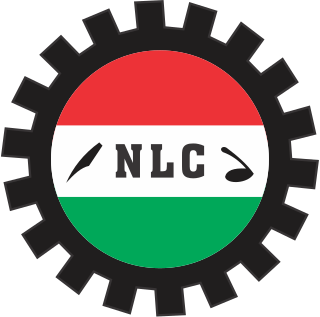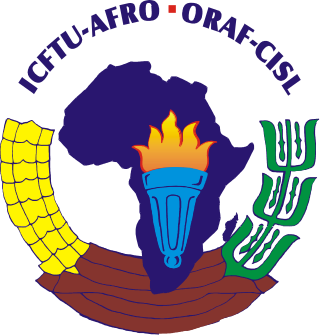Leadership

Presidents
- 1962: H. P. Adebola
- 1971: Yunusa Kaltungo
General Secretaries
- 1962: L. L. Borha
- 1971: E. O. A. Odeyemi
The United Labour Congress (ULC) was a national trade union federation in Nigeria.
The federation was established in 1962, when the Trade Union Congress of Nigeria merged with the Nigeria Trade Union Congress (NTUC). The federation decided not to align with any particular political party, but to affiliate to the International Confederation of Free Trade Unions. This led the NTUC to withdraw. [1] [2]
The federation was led by president Alhaji Haroun Popoola Adebola and general secretary L. L. Borha. It led the formation of the Joint Action Committee, which campaigned for wage increases for labourers. [1] The selection of delegates to the International Labour Organization in 1962 proved a point of conflict, with N. Anunobi and his supporters splitting away to form the Nigeria Workers' Council (NWC). In 1967, affiliated unions based in Biafra split to form the Biafran Trade Union Confederation. [3]
In 1978, the federation merged with the NTUC, the NWC and the Labour Unity Front, to form the Nigeria Labour Congress. [4]


The World Federation of Trade Unions (WFTU) is an international federation of trade unions established in 1945. Founded in the immediate aftermath of World War Two, the organization built on the pre-war legacy of the International Federation of Trade Unions as a single structure for trade unions world-wide. With the emergence of the Cold War in the late 1940s, the WFTU splintered, with most trade unions from the Western-aligned countries leaving and creating the International Confederation of Free Trade Unions (ICFTU) in 1949. Throughout the Cold War, membership of the WFTU was made up predominantly of trade unions from the Soviet-aligned and non-aligned countries. However, there were notable exceptions to this, such as the Yugoslav and Chinese unions, which departed following the Tito-Stalin and Sino-Soviet splits, respectively, or the French CGT and Italian CGIL unions, who were members. With the end of the Cold War and the dissolution of the Soviet Union, the WFTU lost the largest portion of its membership and financial support. Since the start of the 2000s, the organization shifted headquarters to Athens and recruited new members, claiming to have grown from representing 48 million workers in 2005 to 105 million in 2022.

The Nigeria Labour Congress (NLC) is an umbrella organization for trade unions in Nigeria.
The African Trade Union Congress (ATUC) was a national trade union centre in Rhodesia. The ATUC represented black African workers, and was opposed to the system of white minority rule in Rhodesia.

Democratic Confederation of Nepalese Trade Unions (DECONT) was a central trade union organization in Nepal. DECONT is politically tied to the Nepali Congress (Democratic). The president of DECONT was Rajendra Bahadur Raut.

The Italian Labour Union or UIL is a national trade union centre in Italy. It was founded in 1950 as a socialist, social democratic, (republican) and laic split from the Italian General Confederation of Labour. It represents almost 2.2 million workers.
The Nepal Trade Union Congress (NTUC) a national trade union center in Nepal. Founded in 1947, it was the first and largest trade union confederation in country. The NTUC is politically linked with the Nepali Congress (NC).

The National Council of Trade Unions (NACTU) is a national trade union center in South Africa.
Trade unions in South Africa has a history dating back to the 1880s. From the beginning unions could be viewed as a reflection of the racial disunity of the country, with the earliest unions being predominantly for white workers. Through the turbulent years of 1948–1991 trade unions played an important part in developing political and economic resistance, and eventually were one of the driving forces in realising the transition to an inclusive democratic government.
Samuel Udo Basseylisten was a Nigerian trade unionist, he was a member of the radical but now defunct Nigerian Trade Union Congress. Along with, Michael Imoudu, Gogo Chu Nzeribe and Wahab Goodluck, they constituted the activist wing of trade unionism in Nigeria during the Nigerian First Republic. He was a former secretary of Nigeria Produce Marketing Company and the Amalgamated Associated Company.

The ICFTU African Regional Organisation (AFRO) was a regional organisation of the International Confederation of Free Trade Unions (ICFTU), representing trade unions from countries in Africa.
Wahab Omorilewa Goodluck was the founding President of the Nigeria Labour Congress (NLC). During the Olusegun Obasanjo administration in the 1970s, he was barred from trade unionism along with Michael Imoudu, Samuel Bassey and a few others.
The Trade Union Congress is a general trade union in Jamaica. Initially organised as a trade union council to be the labour wing of the People's National Party (PNP) in 1943, the organisation split in 1952 with the formation of the National Workers Union. The TUC was a founding member of the Jamaica Confederation of Trade Unions.
União Geral dos Trabalhadores de Angola was an Angolan trade union organization in exile. UGTA was founded in 1964 following a split away from Liga Geral dos Trabalhadores de Angola (LGTA), and was linked to the Council of the Angolan People. UGTA would later become aligned with UNITA.
The National Trades Union Congress (NTUC) spearheads the labour movement of Singapore, which represents almost a million workers in the country across more than 70 unions, affiliated associations and related organisations. Singapore runs on a tripartism model which aims to offers competitive advantages for the country by promoting economic competitiveness, harmonious government-labour-management relations and the overall progress of the nation.
The South African Congress of Trade Unions (SACTU) was a national trade union federation in South Africa.
The Trade Union Congress of Nigeria (TUCN) was a national trade union federation in Nigeria.
The Nigeria Trade Union Congress (NTUC) was a national trade union federation in Nigeria.
The Nigeria Workers' Council (NWC) was a national trade union federation in Nigeria.
The Labour Unity Front (LUF) was a national trade union federation in Nigeria.
The Trade Union Congress of Nigeria (TUC) is a national trade union federation in Nigeria, focusing on unions representing senior staff.